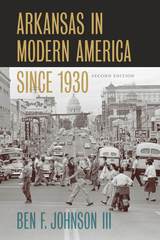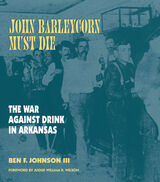3 books about Johnson III, Ben F.

Ben F. Johnson III
University of Arkansas Press, 2000
This elegantly written narrative traces Arkansas's evolution from a primarily rural society in the early 1900s to its expanding manufacturing economy and its growing prosperity and parity with the rest of the nation. Ben Johnson explores the influence of federal-state relations, beginning with the New Deal programs of President Franklin Roosevelt and continuing through the administrations of native son Bill Clinton. With particular sensitivity, he examines organized labor in the timber industry and in row crop agriculture; school desegregation, "white flight," and the private academy movement in the delta region; the growth of Wal-Mart and the poultry industry in the northwest section of the state; and the expansion of outdoor recreation and tourism as lakes were constructed and game populations rejuvenated. This book is particularly impressive for the breadth of its scope. Johnson offers detailed information on women, music and literature, organized religion, environmental trends, and other important cultural influences. Third in the popular Histories of Arkansas series, Arkansas in Modern America extends the narrative into the contemporary era with a format aimed at students and general readers. This important book will set the standard, for years to come, for analysis and interpretation of Arkansas's place in the twentieth century.
[more]

Arkansas in Modern America since 1930
Ben F. Johnson III
University of Arkansas Press, 2019
This second edition of Arkansas in Modern America since 1930 represents a significant rewriting of and elaboration on the first edition, published in 2000. Historian Ben F. Johnson fills in gaps, reconsiders his original conclusions, and reflects on new developments in historical scholarship, extending the book’s analysis of the political, economic, social, and cultural positions into 2018.
Particularly impressive for the breadth of its scope, Arkansas in Modern America since 1930 offers an overview of the factors that moved Arkansas from a primarily rural society to one more in step with the modern economy and perspectives of the nation as a whole. The narrative covers the roles of Daisy Bates, Sam Walton, Don Tyson, Bill Clinton, and other influential figures in the state’s history to reveal a state shaped by global as much as by local forces. The second edition of this important book will continue to set the standard for analysis and interpretation of Arkansas’s place in the contemporary world.
Particularly impressive for the breadth of its scope, Arkansas in Modern America since 1930 offers an overview of the factors that moved Arkansas from a primarily rural society to one more in step with the modern economy and perspectives of the nation as a whole. The narrative covers the roles of Daisy Bates, Sam Walton, Don Tyson, Bill Clinton, and other influential figures in the state’s history to reveal a state shaped by global as much as by local forces. The second edition of this important book will continue to set the standard for analysis and interpretation of Arkansas’s place in the contemporary world.
[more]

John Barleycorn Must Die
The War Against Drink in Arkansas
Ben F. Johnson III
University of Arkansas Press, 2005
As the traditional British folk song that the rock group Traffic made famous in the 1970s and that lends its name to this book’s title demonstrates, the battle against John Barleycorn was a losing one: “And little Sir John and the nut-brown bowl / Proved the strongest man at last.” Ben Johnson’s sweeping, highly readable, and extensively illustrated “spirited” overview of Arkansas’s efforts to regulate and halt the consumption of alcohol reveals much about the texture of life and politics in the state—and country—as Arkansas grappled with strong opinions on both sides. After early attempts to keep drink from the American Indians during the colonial period, temperance groups’ efforts switched to antebellum towns and middle-class citizens. After the Civil War new federal taxes on whiskey production led to violence between revenue agents and moonshiners, and the state joined the growing national movement against saloons that culminated in 1915 when the legislature approved a measure to halt the sale, manufacture, and distribution of alcohol—including that of Arkansas’s substantial wine industry. The state supported national prohibition, but people became disillusioned with the widespread violations of the law. However, the state didn’t repeal its own prohibition law until a fiscal crisis in 1935 required it in order to raise revenue. The new law only authorized retail liquor stores, not the return of taverns or bars. A final effort to restore laws against John Barleycorn in 1950 was rebuffed by voters. Still, there are a number of counties in Arkansas that remain dry and disputes over the granting of private club licenses continue to make news.
[more]
READERS
Browse our collection.
PUBLISHERS
See BiblioVault's publisher services.
STUDENT SERVICES
Files for college accessibility offices.
UChicago Accessibility Resources
home | accessibility | search | about | contact us
BiblioVault ® 2001 - 2024
The University of Chicago Press









